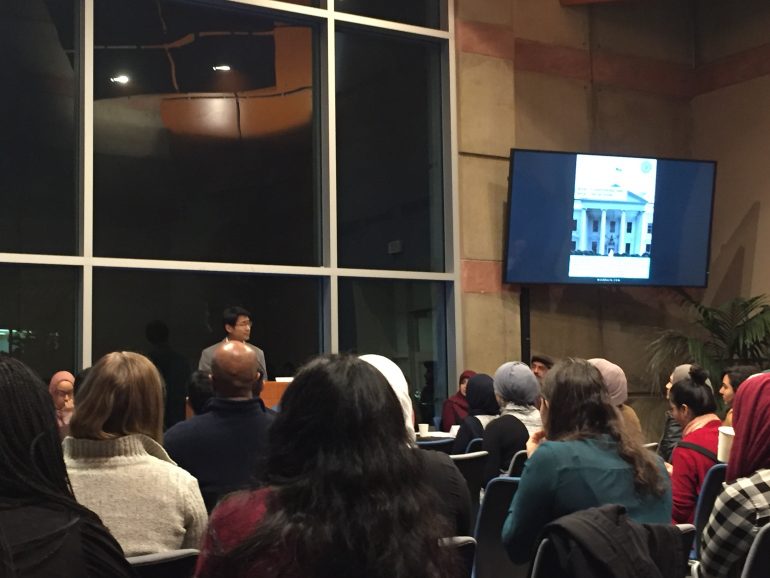On the evening of Feb. 1st, UCLA students, a majority of them Muslim, flocked into Ackerman’s Bruin Viewpoint room to attend “Understanding the Current Political Climate,” an event hosted by the Muslim Student Association.
This event was intended to help students fully grasp the extent and repercussions of President Trump’s executive order to ban immigrants from seven countries — Iraq, Iran, Syria, Somalia, Sudan, Libya, and Yemen — all of them of Muslim majority. The event was also intended to bring the campus community together and to clarify what this ban means for the Muslim community. The panel consisted of six guest speakers: Sam Nahidi, the assistant director of UCLA’s Dashew Center for International Students; Nancy Greenstein, the Director of UCLA’s Police Department; Aisha Sleiman, a 3rd-year law student at UCLA; Yusef Daulatzai, from UCLA’s Counseling and Psychological Services (CAPS); Shaykha Muslema Purmul, the Muslim Champlain of USC and UCLA; and Habiba Simjee, an attorney with UC Undocumented Legal Services Center at the Bruin Resource Center.
Jerry Kang, the Vice Chancellor for Diversity, Equity and Inclusion, opened the conference. As a law professor who is involved in civil rights work and has been practicing law for 20 years, Vice Chancellor Kang expressed his “deep concern to do the fundamentally right and fair thing.” He stated that he, along with other administrators, would like to research matters related to the ban in order to take concrete action in support of Muslim communities and students and help those who are stuck inside or outside the United States. Vice Chancellor Kang proclaimed: “What I am going to do is build an equal room for all; I need to build an equal room [for all], so that regardless of who you are, no matter your religion, your gender, your country of origin, your citizenship. I am going to give them the chance just to learn, an opportunity to study…without obstacles constantly getting in their way. . . I want everyone to play on an equal playing field, and that means when things like this happen we have to do our best. We have to do our best.”
Aisha Sleiman explained who is affected by Trump’s executive order and how they are affected. She stated that aside from the seven aforementioned countries whose immigrants were banned for the next 90 days, other countries may be added. She also said that no Syrian refugees will be allowed to enter the country for the duration of the ban. Furthermore, immigrants attempting to enter the country will be considered on a case-by-case basis. While this ban initially impacted green-card holders, the intervention of Homeland Security made it so that re-entry is now permitted for green-card holders who have passed heavy security checks.
The Dashew Center’s Sam Nahidi explained that the Center acts as a liaison between students and the university and, by extension, the government. He welcomed students, both domestic and international, to come to the Dashew Center when seeking legal advice from an attorney. Nahidi stated that even before Trump’s executive order, immigration law mandated that student visas be revoked in some cases. Therefore, he urged, Muslim students should, as always, beware of even a single arrest, since conviction of a crime could lead to their visas being revoked. Finally, he suggested that students avoid traveling to any of the seven banned countries, likely because they would undergo difficulty returning to the United States under the restrictions of the ban.Trump’s immigration ban on the seven predominantly Muslim countries has been put on hold after the Washington state’s attorney sued Trump, claiming that the ban is unconstitutional–a claim which has gained support from other attorney generals, diplomats, and major US companies. Today, the appeals court will have a hearing in order to determine whether the ban will be reinstated.
Currently, NBC News reports, Trump’s immigration ban has been put on hold after Washington state’s attorney sued Trump, claiming that the ban is unconstitutional — a claim which has gained support from other attorney generals, diplomats, and major US companies. Today, the appeals court will have a hearing in order to determine whether the ban will be reinstated.

